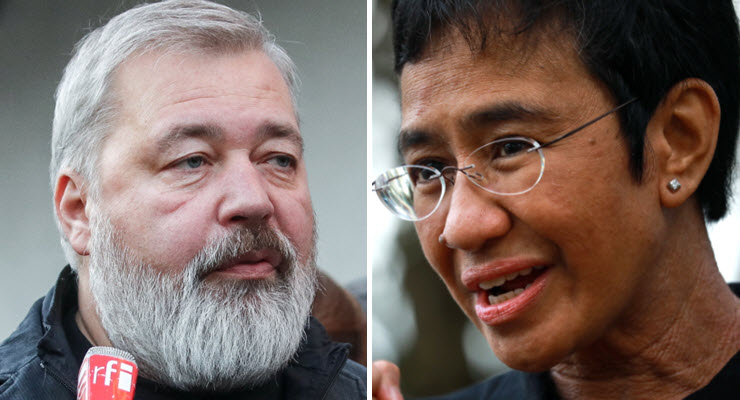
The awarding of the Nobel Peace Prize to journalists Maria Ressa and Dmitry Muratov is a celebration of the global shift to a new type of journalism — accountability reporting that is unafraid of challenging power.
It’s a critique of the deadening style of commodified “news” dolloped out in so much of modern (particularly Anglophone) media. In countries on the front line of the struggle against authoritarianism — like Muratov’s Russia or Ressa’s Philippines — the award recognises that it’s the moral power of journalism that most effectively builds resistance.
The award recognises too that this craft shift is being driven by new (or newish) outlets like Muratov’s Novaya Gazeta (launched in 1993) and Ressa’s Rappler (2012).
Ressa is cofounder and CEO of the digital news site which, the Nobel Committee said, has exposed “abuse of power, use of violence and growing authoritarianism” in the Philippines.
The committee said Rappler “has focused critical attention on the Duterte regime’s controversial, murderous anti-drug campaign [and has] also documented how social media is being used to spread fake news, harass opponents and manipulate public discourse”.
“Nothing is possible without facts,” Ressa responded. “A world without facts means a world without truth and trust.”
Muratov is cofounder and editor-in-chief of Novaya Gazeta, which, the committee said, has brought “fact-based journalism and professional integrity” to reporting stories ignored by much of the Russian media: “Since its start-up in 1993, Novaya Gazeta has published critical articles on subjects ranging from corruption, police violence, unlawful arrests, electoral fraud and ‘troll factories’ to the use of Russian military forces both within and outside Russia.”
The experiences of Novaya Gazeta and Rappler show that authoritarian rulers have learned that countering new media means new modes of repression, either through the adaptation of old laws like defamation and tax auditing, or through criminal violence.
Six Novaya Gazeta journalists have been murdered over the years, including Anna Politkovskaya in 2006. The anniversary of her death (October 7 — Russian President Vladimir Putin’s birthday) came the day before the Nobel announcement. Although five men were convicted of the murder, it’s still not known who ordered the killing.
In accepting the prize, Muratov said: “This prize is for Dmitry Domnikov, Yuriy Shekochikhin, Anna Politkovskaya, Stas Markelov, Anastasia Baburova, Natasha Estemirova, the father-founders of the newspaper who the war took away from us, all our killed professionals, who gave their lives to the profession.
“Since they don’t give post-mortem Nobel prizes, I think they just found a way for Anya to get the prize through the second pair of hands.”
Ressa and Rappler have been targeted through the legal system, including criminal charges for online libel under the Philippines’ CyberCrime Prevention Act. She is currently appealing a cyber libel conviction for which she could face six years in prison.
Rappler has also been investigated under tax laws, a popular stunt by authoritarians. In India under Narendra Modi, for example, independent media have found their offices raided and books investigated by tax authorities.
Neither Putin nor the Philippines’ Rodrigo Duterte have publicly commented on the award. A Kremlin spokesperson congratulated Muratov, saying, “He persistently works in accordance with his own ideals. He is devoted to them. He is talented. He is brave.” State-backed media in Russia has been more critical, as have old-guard journalists and writers in the Philippines. It’s not yet clear whether either Ressa or Muratov will be able to use their share of the $2 million prize to support their work due to laws around the foreign funding of media in their countries.
Recognising journalism is always tricky for the prize committee. Ressa and Muratov are the first journalists to be awarded the Nobel since Carl von Ossietzky was recognised in 1935 for exposing Germany’s secret rebuilding of its air force in the 1920s. Ossietsky was jailed for treason and espionage and blocked from receiving the award.
When Chinese writer Liu Xiaobo was awarded the prize in 2010, the authorities not only prevented him from attending (already in jail, he would not be released until shortly before his death in 2017) but also censored local reporting and pressured friendly countries to boycott the prize ceremony.








Neither Putin nor the Philippines’ Rodrigo Duterte have publicly commented on the award [to journalists Dmitry Muratov and Maria Ressa].
In 2017 ICAN (International Campaign Against Nuclear Weapons) was awarded the Nobel Peace Prize. Its first ever launch was in Melbourne in April 2007. PM Turnbull did not comment on the 2017 ICAN award. I recall this clearly as one of my neighbours was amongst the Australian founders and was present at the Melbourne launch. I felt quite proud to know her and felt that Turnbull’s failure to acknowledge the Australians involved signified a terrible meanness of spirit on his part.
Kind of puts things in perspective for us in Oz. We just have to wade through the mud of Government inaction, not be buried in it.
Julian Assange
Interesting, apart from murder and/or long term detention of journalists, how different is Australia where harassment of non legacy media, journalists and comments has become a political strategy?
While legacy media journalists follow the government’s, LNP’s or NewsCorp’s central/national narratives, there is no investigative journalism scrutinising issues, sectors, regions etc., nor any strategic holding to account of the government?
After hearing Tony Jones on ABC huffing and puffing at then journalism professor Jay Rosen of NYU a decade ago, who commented how ‘Insiders’ shows how insidious and insipid Australia media has become, paraphrasing, Jones response was ‘no, we ask the heard question here!’, Rosen replied ‘sure you do…’.
‘heard’ = ‘hard’
Independent newspapers in Australia do not moderate their comment sections, they censor them. Propaganda has taken hold.